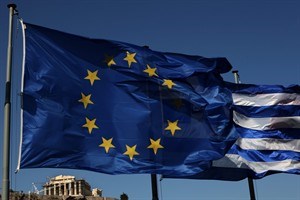
An EU and a Greek flag fly in front of ancient Parthenon temple, in Athens, Sunday, June 17, 2012. THE CANADIAN PRESS/AP, Petros Giannakouris
June 17, 2012 - 2:29 PM
TORONTO - The eurozone will be in focus this week as traders hope for more clarity as to whether Greece remains in the 17-nation eurozone and also look to moves by officials in the monetary union that could ease the growing pressure on borrowing rates for Spain and Italy.
Investors also looked to the U.S. Federal Reserve to provide an indication that it is willing to provide another round of stimulus to help a slowing economy.
Greeks were voting Sunday for the second time in six weeks to try to elect a new government. The outcome will determine whether the country sticks to its highly unpopular austerity program of tax hikes and spending cuts that a previous government accepted in order to receive billions of euros in bailouts that are keeping the country afloat.
Exit polls suggested that no party appeared to have won enough seats to form a government on its own. They did suggest that the country's two traditional parties — New Democracy and PASOK — will have enough seats to form a pro-euro coalition together.
There was fear that if political parties were elected that favour reneging on the austerity program, the international bailout and Greece's membership in the euro currency union would be at risk.
It was considered doubtful that traders will wake up Monday morning with a clear idea of whether Greece is in or out of the eurozone.
"There are still going to be a lot of ifs there, even when you get an answer as to who won the election," said Sadiq Adatia, chief investment officer at Sun Life Global Investment.
He says there could be a boost to markets if parties backing austerity win, but it won’t last.
And if anti-austerity parties take power, "people might be looking at it and saying, the obvious part of the eurozone is now out or will be out, which makes the rest of the eurozone much stronger and contagion impacts are less likely."
"But they will also understand that initially, there can be a lot of havoc. And that problem might cause the market to be still down for another three or four months."
On Friday, traders showed some confidence about the impact of the election on the European economy after the president of the European Central Bank said it would continue its "crucial role" of making sure the financial system has sufficient cash.
Toronto's S&P/TSX composite index ended 58.48 points higher to 11,524.90 last week, rising 0.2 per cent over the week.
On Wall Street, the Dow Jones industrial average was ahead 115.26 points at 12,767.17, up 1.7 per cent for the week. The Nasdaq composite index rose 36.47 points to 2,872.80.
Equally important to traders is how the eurozone government debt crisis contagion has spread to Spain and Italy and what officials will do about it.
Spain’s borrowing costs jumped close to the unsustainable seven per cent mark last week, despite fellow eurozone countries making available up to €100 billion to bail out banks crushed by the weight of bad loans, a legacy of the collapsed real estate market.
But Moody’s downgraded Spain’s government debt last Wednesday. It sees the bailout funds adding considerably to the country’s debt burden.
And Italy’s 10-year borrowing rate rose to 6.07 per cent from 6.02 per cent, and the interest rate on its one-year bonds also rose sharply. Italy is seen as the next most likely eurozone country to seek a bailout.
"(Eurozone officials) know what to do, they probably have the instruments to do it," said John Johnston, chief strategist at Davis Rea Ltd.
"But they need to be creative and forceful and the Germans are the ones who need to do it. They don’t seem to be willing."
He said the eurozone can survive but it must move to greater integration.
In particular, Johnston said the banking crisis is the critical focus in the short run.
"You have to have a central bank that’s dedicated to financial stability," he said.
"The European Central Bank hasn’t been given that mandate, it must be given that. This means they pump more money into the system, cut interest rates, regardless of their views on inflation."
The U.S. Federal Reserve will also be in focus as it makes its next interest rate announcement Tuesday.
There is no mystery insofar as rates are concerned since the Fed is committed to keeping rates near zero for the foreseeable future.
But slowing economic conditions around the globe, partly because of worsening economic conditions in Europe, have encouraged traders to believe that the central bank will embark on another round of stimulus.
"Certainly, there’s a growing recognition at the Fed that it probably needs to do another round of something," said Johnston.
"I guess the question is whether the case is strong enough just yet. The things we’re all doing our hand wringing about are all offshore. And the Fed can’t do a whole lot on that front."
A couple of problems confront Fed chairman Ben Bernanke.
It’s an election year and further stimulus measures could attract huge criticism from the Republicans.
But it’s also a question of how much support Bernanke would have for further stimulus.
"Bernanke may not have enough support, he may have to say, well, we will keep monitoring it and by the time August rolls around, things should be clear enough where maybe they have to do it."
News from © The Canadian Press, 2012